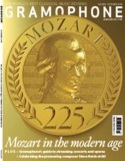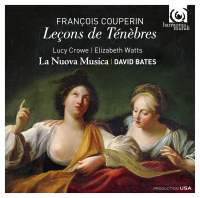Texte paru dans: / Appeared in: |
|
|
Outil de traduction (Très approximatif) |
|
|
Reviewer:
Julie Anne Sadie
La Nuova Musica, anticipating the 2017 Lenten season, have coupled lamentations by two turn-of-the-century (17th to 18th) French composers – one an amateur, the other highly professional, both ardent admirers of the Italian style. The twist is that Brossard was composing for Meaux Cathedral and Couperin the relatively private contemplation of the elderly Louis XIV. Brossard’s Stabat mater has been recorded twice before – by Olivier Schneebeli (Astrée/Naïve, 1/98) and Hervé Niquet (Glossa, 2/11) – though each received a lukewarm review in these pages. La Nuova Musica, directed by David Bates, give a dramatic, well-paced performance that shows Brossard’s slender if learned talent to best effect. Unlike Schneebeli, who employed boy sopranos and Old French pronunciation of the Latin texts, Bates produces a more modern, full-bodied sound, and it is the grands choeurs rather than the petits choeurs that most impress. To add to our impression of Brossard, the first recorded performance is included of his unpublished E minor Trio Sonata, which clearly reflects Brossard’s knowledge and command of the instrumental styles of Corelli and his Italian predecessors and provides another interesting parallel with Couperin, who was composing ‘sonades’ at much the same time. Strange then that, in spite of the meticulous booklet-notes by James Halliday, the title of the CD fails to mention Brossard. Instead, it trades on the greater lustre of Couperin’s three surviving Leçons de Ténèbres and the acclaimed sopranos Lucy Crowe and Elizabeth Watts, making their recording debuts in French Baroque repertoire. The lush tone and panoramic range of emotion they employ are more suited to the Lieder and opera they normally perform than to Couperin’s rarefied chamber music, which demands greater serenity, impeccably executed ornamentation and an intimate dynamic range. Couperin’s Leçons, which so eloquently and sublimely unite the French and Italian styles of the day, have been recorded many times by some of the finest French stylists of our day; regrettably, these performances add little to our appreciation. |
|




